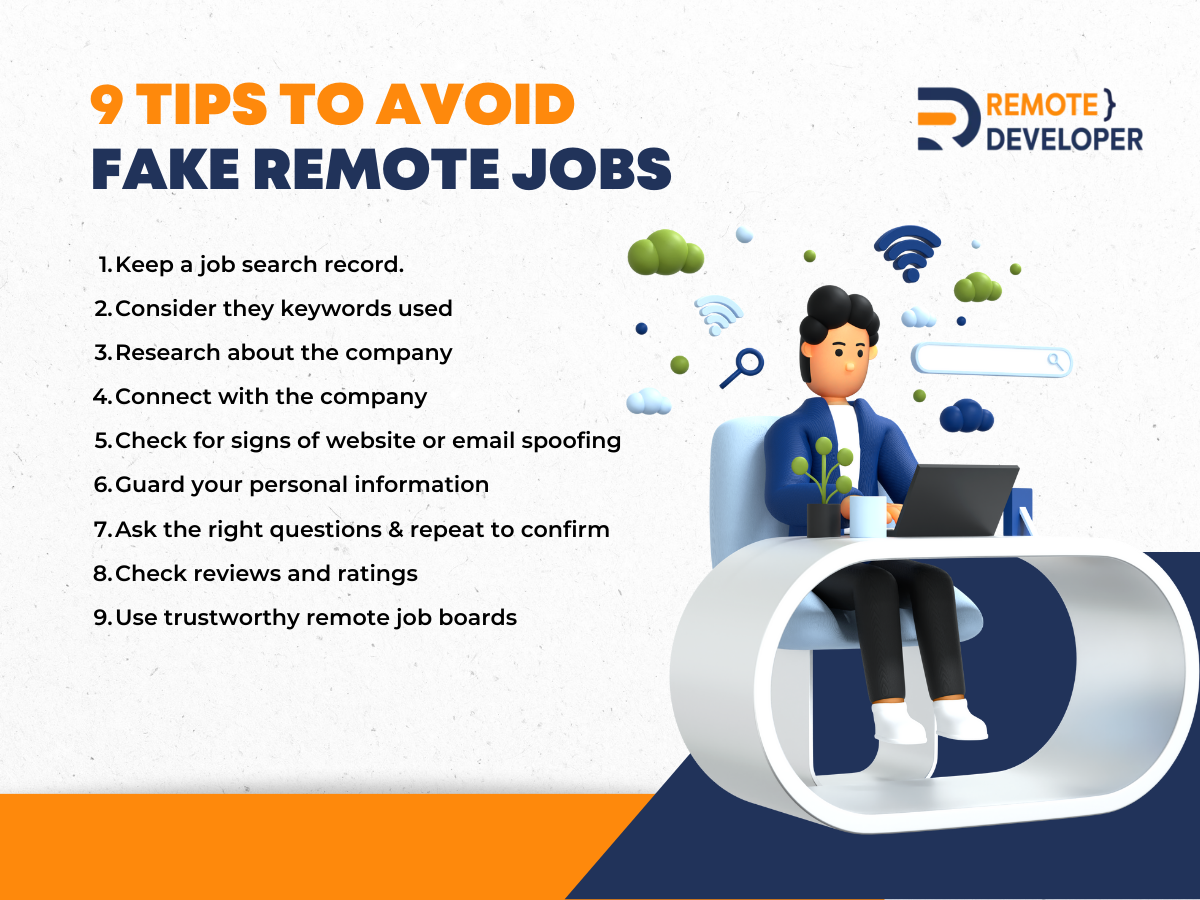Employment fraud has always been a pressing issue. Moreover, in recent years, fake remote jobs have become more sophisticated and harder to detect in response as more companies around the world have transitioned to hybrid and remote operations.
So, to help you find the highest-paying jobs offered by legitimate businesses, we put together this article. Here, you will learn how to identify fake job offers and a couple of tips to help you avoid them.
What are Fake Remote Jobs?
A fake job listing is a type of fraud where scammers post deceptive listings online. This scam intends to appeal to job seekers with too-good-to-be-true offers and then hoodwink them into sharing sensitive personal information or sending money.
Due to the outbreak of the global pandemic back in 2020, companies across industries quickly adapted to hybrid or remote work operations. Consequently, reports of fake remote jobs have inflated so much that it has tripled between 2020 and 2021 alone.
How to spot fake remote jobs
With that said, how to tell if an online job is legit? We listed below the tell-tale signs you should always look out for when you are applying for new jobs.
Does not have any online presence
One of the immediate red flags of work-from-home online jobs frauds is that they do not have any online presence.
Usually, recruiters from legitimate companies would at least share a link that leads to their website. In addition, there are social networking sites, such as LinkedIn, wherein real businesses have their own profiles. Moreover, most fake remote jobs and scammers do not even provide the name of the company.
Posts poor-quality job ads
Another giveaway is the quality of the job ads that most scammers post on job listing platforms. Whether these have minute grammatical errors or the scope of the fake online jobs list is unclear.
However, that is not to say that most, if not all, fake remote jobs are written poorly. In fact, some are meticulously written to appear more genuine.
Even so, make sure to carefully check the following aspects of a job listing before you click on the “Apply” button:
- Capitalisation
- Grammar
- Spelling
- Punctuation
- Verb Tense
Needs immediate hiring
You should be wary of job ads that convey urgency such as “immediate hiring” or have an accelerated hiring process.
Most scammers have a tight time limit for job applications for three reasons: One, to appeal as an in-demand company with only a few positions left due to the volume of applicants. Two, to put pressure on the unsuspecting applicants and commit. Three, to induce a sense of confusion and prevent people from making sound decisions.
Initiates first contact even without a job application
It is also commonplace for scammers to initiate contact first. This can be fake job text messages, calls, emails, or reaching out via other platforms.
First, they catch you off-guard since the first contact was initiated by the fake recruiter. Two, they inflate your ego by saying they found your resume or credentials through LinkedIn, a job listing platform, or a social networking platform. Three, they pique your interest and essentially offer the position to you already even without a proper interview.
Offers high salary despite vague job responsibilities
Sometimes it feels like a job offer can be too good to be true. There are times when it is because it is a scam.
Usually, fake remote jobs have vague job responsibilities or show basic requirements but promise high salaries that most working adults can actually apply for.
On the other hand, real remote job listings are quite detailed:
- Job title
- List of daily tasks that an applicant is expected to fulfil
- Required education or experience
- Information about the company
- Clear expectations for the position
Communicates via a Personal Email Account
Recruiters affiliated with legitimate companies use their company email to communicate with unsuspecting applicants. Most, if not all, actually have the name of the company after the “@” symbol.
As a rule of thumb, be wary of personal email addresses with a long string of numbers. In addition, just do not send job applications or your resume via email.
Remember to check if it is a real person with an official email domain address from a legitimate company.
Asks for confidential personal information
As mentioned earlier, fake recruiters intend to hoodwink unsuspecting people into sharing their personal information.
Some ask for it via email while others are more covert and lead you to a website. There, scammers will ask for the following information as if it is part of the application process:
- Bank information
- Credit card information
- Driver’s license
- Social security number
- Other personal information
Requests for a deposit or any monetary transaction
One of the glaring hallmarks of fake remote jobs is convincing unsuspecting applicants into making any form of monetary transaction. This can be through debit cards, wire transfers, online payments, or any other option.
One thing you should never forget is that a legitimate company will not require you to make any monetary transaction. In fact, remote companies will either list down the technical requirements for the necessary equipment or provide it for you.
With that said, you should also be wary when recruiters require you to pay for these:
- Background checks
- Credit reports
- Company program or software
- Online courses
- Starter kit
- Training materials
9 Tips to avoid fake remote jobs
So you know how to identify fake job offers. Now, the question is how to avoid work-from-home online jobs frauds or at least minimise your chances.
Keep a job search record
The best thing you can do to avoid scammers is to keep a list of all the job listings that you have applied for. Make sure to add the following:
- Links to the job listings
- Company details
- Job title and description
- Where you found the job listing
- Name of recruiter
- When you applied for the job
It would be better if you get as detailed as possible. So, you can also include up to what point of the application process you achieved.
Consider the keywords used
There are certain keywords that most scammers use to entice unsuspecting applicants. Here are a couple of keywords that are commonly used for work-from-home online jobs frauds:
- Easy hiring
- Quick hiring
- Free work-from-home jobs
- Quick money
- Unlimited earning potential
- Investment opportunities
- Part-time position with full-time pay
Research about the company
Most legitimate remote companies have an online presence and have a connection with their employees on LinkedIn and other social networking platforms. In addition, some employees share company events and even showcase the successful remote work environment on their personal social media accounts.
That means it is easy to research the companies you are applying for. In fact, most job listings even have a link that leads to business websites as proof of legitimacy.
Connect with the company
There are times when a recruiter or hiring manager reaches out first. Whether they are the real deal or a scammer, the best course of action is to ask about the company and go straight to the source.
It is better if you reach out directly to the company through the available communication channels. You can also check their website for the job listing you have applied for. Another option is to get in touch with other employees as well to double-check.
If a recruiter does not wish to disclose the name of the company and other relevant information then it is best to stop it altogether.
Check for signs of a website or email spoofing
However, some fake remote jobs are more believable than others. These are the type of fraudsters who impersonate legitimate companies by using their name and information.
In this case, check for signs of spoofing:
- Company’s URL should begin with “HTTPS”
- Branding should be present
- Job listing has minimum requirements for education and skills
Guard your personal information
Hiring managers will ask you to fill out applications, questionnaires, and even answer assessment tests. This is just a way to help them cut down the number of interested applicants into a shortlist. However, they will never ask for sensitive personal information.
Ask the right questions & repeat to confirm
It is important to do your homework and research a company and the job listing you applied for. Aside from acing the interview, it is also to ensure that you ask the right questions.
It is better if you prepare a list of questions ready before the interview starts. Moreover, if you are interviewed by multiple people in an accelerated hiring setup, you can ask the same questions and cross-check for any discrepancies.
Check reviews and ratings
Another thing you should always check is the reviews and ratings about a company. Before you click on the “Apply” button make sure to check every available review platform to get a better sense of the company.
Keep in mind, some reviews are written at the behest of the company itself to look more appealing. However, what you should look for is the substance of the reviews.
Furthermore, you can also check out forums like Reddit where people give their honest feedback or share their experiences when they were affiliated with the company you are applying for.
Use trustworthy remote job boards
Last but not least, only send your applications to trustworthy companies and job boards. It would be better if these specifically offer remote work opportunities.
Always be diligent and pay attention to everything
With that said, we cannot fully guarantee you can avoid fake remote jobs. Employment scam operations continue to evolve and become more sophisticated which makes it harder and harder to spot the real and fake.
That is why we strongly encourage you to take everything with a grain of salt, do your homework thoroughly, and pay close attention to every detail. This is the best and tried-and-tested way to help you avoid scams.
Job-related scams go both ways. Instead of just posting ads, get your dedicated team of experts with an outsourcing partner like Flexisource IT.


